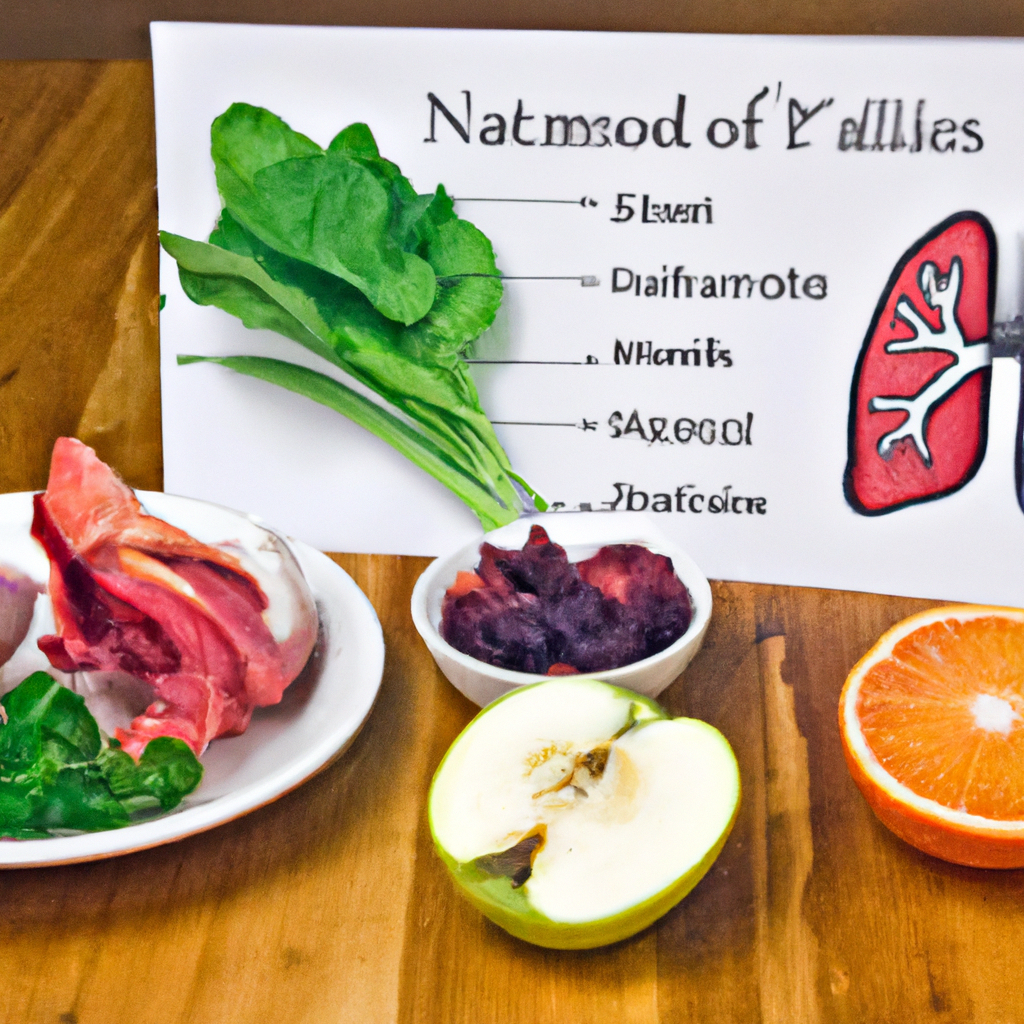Are you looking for some creative ways to improve your respiratory health? Look no further! Adopting a diet rich in healthy foods is essential for lung health and respiratory function, and fortunately, the foods that benefit your lungs can be both delicious and nutritious. Read on to discover which foods are good for you, and arguably one of the most important organs in the body – the lungs.
1. Nutrients for Respiratory Wellness
If you’re serious about improving your respiratory health, there are several important nutrients that you need to consider. Good nutrition should always be an important part of any wellness plan, and this holds true for respiratory health as well.
Vitamin C: Vitamin C is essential to respiratory health and has been associated with a decreased risk of infection. It can also reduce inflammation of the airways and help relieve the symptoms of allergies. Citrus fruits, leafy greens, and bell peppers are excellent sources.
Vitamin D: Vitamin D plays an important role in lung health. Studies have shown that people who don’t get enough of this vitamin may have a higher risk of developing asthma and other respiratory illnesses. You can get vitamin D from fortified foods or non-vegan sources such as fatty fish, beef liver, and egg yolks. Spending a few minutes in the sun each day can also help boost your vitamin D levels.
Omega-3s: Omega-3 fatty acids are known for their anti-inflammatory properties. They can help reduce the risk of asthma and other respiratory diseases. Foods such as salmon, chia seeds, flaxseeds, and walnuts are good sources of omega-3s.
Selenium: Selenium is a trace mineral found in foods such as nuts, whole grains, shellfish, and eggs. Selenium can help reduce inflammation in the lungs and protect against respiratory viruses. It is also important for maintaining normal lung function.
2. Eating for Healthy Lungs
- Replenish Vitamin B – Healthy breathing begins with strong nutrients. Vitamins B6, B12, and B9 are essential for healthy lung function and can be found in foods like eggs, salmon, and edamame.
- Fill Up on Omega-3 Fatty Acids – Fish, nuts, and plant-based oils are rich in Omega-3 fatty acids and can help reduce inflammation in the lungs. Eating plenty of these can make the airways more relaxed to ease breathing.
- Fill Your Plate with Vitamin E – Vitamin E may help protect lung tissue from damage caused in some diseases. Nuts, seeds, and spinach are all great sources of vitamin E and can make for a tasty meal.
Adding healthy foods to your diet can help nourish your lungs to keep them performing their best. Below are some tips to help you get the most out of your meals for lung health.
Load Up on Fruits and Vegetables – Eating plenty of natural, antioxidant-rich produce is key for keeping your lungs lush. Opt for potassium-packed choices like broccoli, avocado, and sweet potatoes, and don’t forget to mix in some colorful fruits like strawberries, blueberries, and oranges.
Aim for High-Protein Options – Protein keeps your lungs in top shape by helping them develop and repair internal muscle tissue. Try to include at least a couple of protein sources in each meal, such as chicken, tofu, or legumes.
Sip on Herbal Teas – Herb-infused teas are a great way to relax your airways and improve breathability. Sipping on teas like chamomile, peppermint, or lavender can help deepen breaths and provide a moment of mental clarity.
is easier than you might think. Start with healthy, nutritious foods and don’t be afraid to experiment with new recipes and flavors to keep your lungs nourished.
3. Superfoods for Respiratory Health
Taking care of your respiratory system is key to maintaining overall good health. Eating the right foods can help support your lungs to keep them in peak condition. Here are some great superfoods to help promote respiratory health:
- Carrots: Rich in beta-carotene, consuming carrots can help reduce respiratory inflammation. Carrots also contain high levels of potassium, vitamin C, magnesium and zinc, which can also impact respiratory health.
- Nuts: Eating nuts like almonds, pistachios and walnuts can help to reduce inflammation and mucus from the lungs. Studies have found that such foods can help reduce phlegm and improve asthma symptom.
- Citrus Fruits: Oranges, lemons and limes, among other citrus fruits, are abundant in Vitamin C, a powerful antioxidant. Vitamin C can help prevent respiratory diseases as it helps to inhibit bacteria growth and fights against inflammation.
- Garlic: This pungent root is packed with flavonoids and allicin, which contain anti-inflammatory and anti-bacterial properties. Studies have suggested garlic can reduce the risk of a common cold and other ailments.
- Green Tea: One of the best beverages for your respiratory health, green tea is high in antioxidants and helps improve breathing. It has been proven to reduce the risk of developing asthma and improve symptoms associated with bronchial asthma.
Incorporating these superfoods into your diet is a great way to start boosting your respiratory health. Try having some carrots and nuts as a snack, or drink some green tea in the morning to jumpstart your lungs. Eating these superfoods consistently is sure to help support and promote good respiratory health.
4. A Breath of Fresh Air: The Power of Nutrition
Fuel Your Body and Mind
It’s no surprise that what we put into our bodies can have a huge impact on how we feel. What many people don’t realize is that our nutrition can be as powerful as a fresh breath of air. Eating a healthy, well-rounded diet can improve our physical and mental wellness; if we properly nourish ourselves our bodies and minds will thank us.
The secret to feeling energized, alert, and capable of conquering whatever comes our way can be found right at our dinner table and in the contents of our pantry. Eating whole, nutrient-dense foods can provide us with vitamins, minerals, and dietary fiber that our bodies need.
- Fruits and vegetables are vital sources of antioxidants.
- Whole grains provide dietary fiber and B vitamins.
- Beans and legumes are great for increasing protein intake.
- Nuts and seeds are packed with healthy fats and minerals.
- Lean proteins help build and repair body tissue.
By cycling through a variety of these wholesome ingredients, we can make sure our diets have the right balance of essential vitamins and minerals and help fuel our powers of concentration and productivity. Eating the right foods can increase our energy, improve our mood, and promote general wellbeing.
With the right nutrition, you can help keep your lungs healthy and happy for years to come. Eating the right foods now can be a great way to ensure your respiratory health in the future. Investing in your lung health is one of the best investments you can make in your overall wellbeing.



